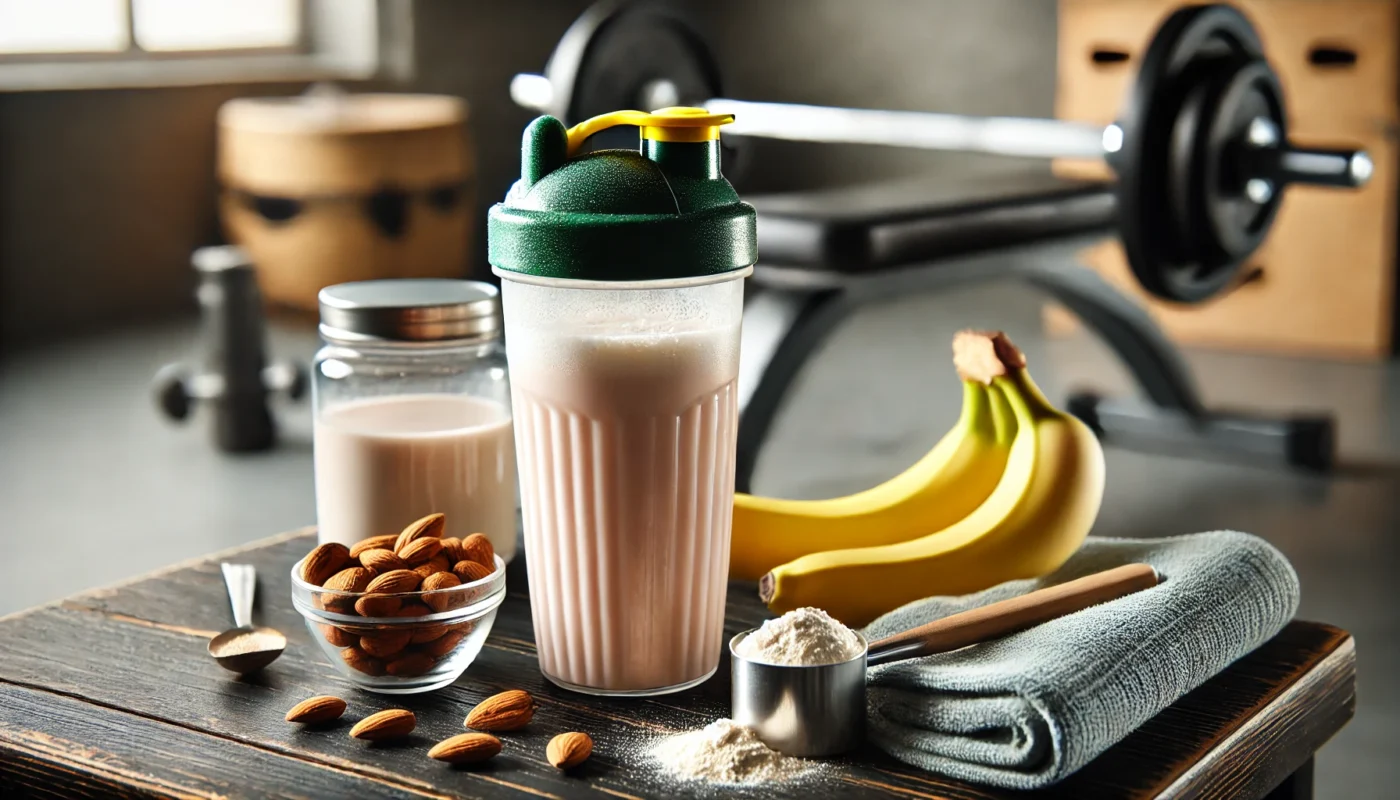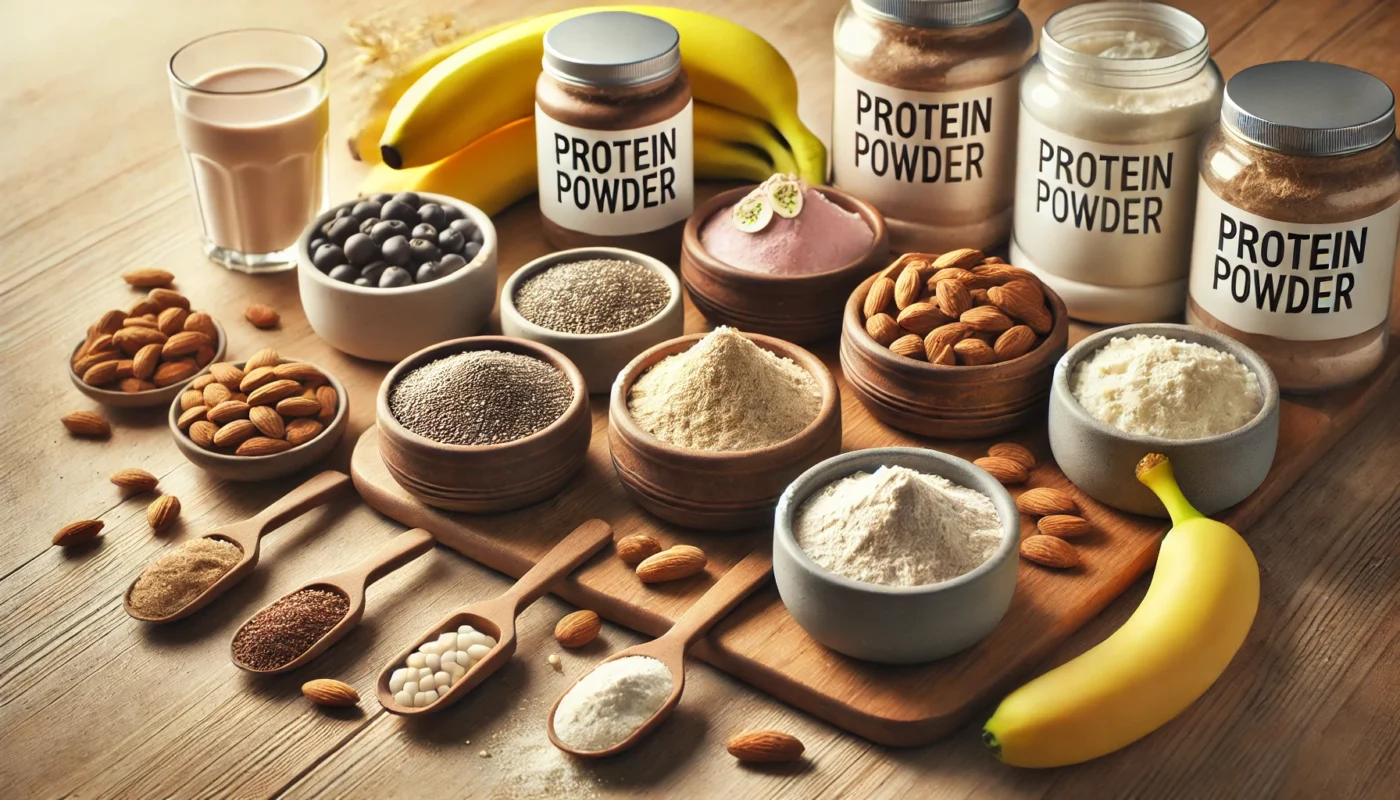Before diving into specific recommendations, it’s essential to understand what protein powders are and how they function. Protein powders are dietary supplements derived from various sources, including whey, casein, soy, pea, and hemp, each offering unique benefits. They provide a concentrated source of protein that can help repair tissues, support immune function, and maintain lean muscle mass.
You may also like: High Protein Foods to Fuel Workouts

Types of Protein Powders
Protein powders come in a variety of forms, each sourced differently. Whey and casein, both derived from milk, are popular among those who consume dairy. Soy, pea, and hemp, however, cater to the plant-based community. These options ensure that no matter your dietary restrictions, you can find a protein powder that works for you. Each type also has different absorption rates and amino acid profiles, which can influence your choice depending on your goals.
How Protein Powders Work
At their core, protein powders serve to supplement your diet with additional protein. They are broken down into amino acids during digestion, which then contribute to muscle repair and growth. This process is crucial, especially if you’re engaging in regular exercise or strength training, as it helps rebuild muscles and can enhance recovery. Protein powders also play a role in satiety, helping you feel fuller longer, which can aid in weight management.
The Role of Protein in the Body
Protein is a fundamental building block in the human body, involved in the creation and repair of tissues. Beyond muscles, proteins are vital for producing enzymes and hormones, which regulate various bodily functions. A sufficient intake of protein is necessary for maintaining a healthy immune system and overall well-being. When you consume protein powders, you are essentially fortifying your body’s ability to function optimally while pursuing weight loss.
Benefits of Protein for Weight Loss
Protein is a macronutrient that plays a crucial role in weight management. It helps maintain muscle mass, which is vital for a healthy metabolism, and it can also increase satiety, reducing overall calorie intake. When incorporated into a balanced diet, protein powders can enhance these effects, providing a convenient and efficient way to meet your protein needs.
Enhancing Metabolic Rate
One of the primary benefits of protein for weight loss is its ability to boost your metabolic rate. Protein requires more energy to digest compared to fats and carbohydrates, a process known as the thermic effect of food (TEF). This increase in energy expenditure can aid in burning more calories throughout the day, supporting weight loss efforts without additional exercise.
Promoting Satiety and Reducing Cravings
Protein has a significant impact on hunger hormones, which can help reduce cravings and promote satiety. By stabilizing blood sugar levels and reducing the hunger hormone ghrelin, protein intake can prevent overeating and support a calorie deficit. This makes it easier to manage portion sizes and resist the urge for unhealthy snacks, a common hurdle in weight loss journeys.
Preserving Lean Muscle Mass
During weight loss, preserving lean muscle mass is crucial to maintaining a healthy metabolism. Adequate protein intake ensures that while you’re losing fat, your muscles are protected from catabolism (breakdown). By supplementing with protein powders, you can support muscle retention, ensuring that most of the weight lost is fat rather than muscle, leading to a more toned physique.
Best Protein Powders for Burning Fat and Gaining Muscle
Finding the best protein powder for burning fat and gaining muscle involves considering factors such as protein content, source, and additional ingredients. Here are some top contenders:
Whey Protein
Whey protein is one of the most popular protein supplements due to its high-quality amino acid profile and rapid digestibility. It is particularly effective for muscle growth and recovery, making it an excellent choice for those seeking to build muscle while losing fat. Studies have shown that whey protein supplementation can improve body composition by increasing lean body mass and reducing fat mass.
Advantages of Whey Protein
Whey protein stands out for its complete amino acid profile, which includes a high concentration of branched-chain amino acids (BCAAs) like leucine. These are critical for muscle protein synthesis and recovery. Additionally, whey is absorbed rapidly, making it ideal for post-workout shakes when your body needs nutrients quickly. This swift absorption helps maximize the anabolic window post-exercise, promoting muscle repair and growth.
Variants of Whey Protein
There are several forms of whey protein, including concentrate, isolate, and hydrolysate. Whey concentrate is the most common and affordable, containing some fats and carbohydrates. Isolate is processed further to remove most of these, offering a higher percentage of protein. Hydrolysate is pre-digested, making it the fastest absorbing, but also the most expensive. Your choice will depend on dietary preferences and budget.
Considerations for Whey Protein Use
While whey protein is beneficial, it’s essential to consider any dairy sensitivities or allergies, as it is derived from milk. Lactose-intolerant individuals may prefer whey isolate due to its lower lactose content. Furthermore, always check for added sugars or artificial additives in flavored whey products that could counteract weight loss efforts.
Casein Protein
Casein protein, a slow-digesting milk protein, is ideal for prolonged periods without food, such as overnight fasting. It provides a steady release of amino acids, which can help preserve muscle mass and prevent muscle breakdown during weight loss. This makes it an excellent option for those who wish to maintain muscle while burning fat.
Benefits of Slow Digestion
The slow digestion rate of casein makes it perfect for sustaining amino acid levels in the bloodstream over extended periods. This characteristic is particularly beneficial overnight, as it prevents muscle catabolism during fasting periods. By maintaining a positive protein balance, casein supports continuous muscle repair and growth, which is vital for achieving a lean physique.
Casein Versus Whey
When comparing casein to whey, the primary difference lies in the absorption rate. While whey is optimal for quick recovery post-exercise, casein is better suited for periods without food intake. This makes them complementary supplements; many athletes and fitness enthusiasts choose to incorporate both into their regimen to maximize muscle preservation and growth.
Ideal Usage Scenarios
Casein protein is best consumed before bed or during long intervals between meals, providing a sustained protein source. It can also be used in cooking or baking due to its thicker consistency, adding a protein boost to various recipes. This versatility makes it a valuable addition to your dietary arsenal, supporting weight loss and muscle maintenance.
Plant-Based Proteins
For those who prefer plant-based options, pea and hemp proteins are excellent choices. Pea protein is rich in essential amino acids and has been shown to support muscle growth comparable to animal-based proteins. Hemp protein, on the other hand, is rich in omega-3 fatty acids and fiber, making it beneficial for heart health and digestion while supporting weight loss.
Advantages of Plant Proteins
Plant-based proteins offer a sustainable and ethical choice for those avoiding animal products. They are often hypoallergenic, making them suitable for individuals with sensitivities to dairy or soy. Additionally, plant proteins come with added nutrients like fiber and antioxidants, which can enhance digestion and overall health, contributing to a more balanced diet.
Pea Protein for Muscle Growth
Pea protein is an excellent source of branched-chain amino acids and arginine, supporting muscle growth and heart health. It is comparable to whey in its ability to promote muscle repair and synthesis. For vegans or those with lactose intolerance, pea protein provides a viable alternative to animal-based supplements, ensuring that dietary restrictions do not hinder fitness goals.
Benefits of Hemp Protein
Hemp protein stands out for its nutritional profile, offering a good balance of omega-3 and omega-6 fatty acids, which support cardiovascular health. The high fiber content aids digestion and can help maintain satiety, reducing overall calorie intake. This makes hemp protein a well-rounded choice for those focused on both weight loss and overall wellness.

Choosing the Best Protein for Muscle Growth and Weight Loss
When selecting a protein powder, consider the following factors to ensure it aligns with your health and fitness goals:
Amino Acid Profile
Ensure the protein powder contains all essential amino acids, particularly leucine, which is vital for muscle protein synthesis. A complete amino acid profile will support muscle growth and repair, crucial for maintaining muscle while losing fat.
Importance of Leucine
Leucine is a key amino acid that stimulates muscle protein synthesis. It plays a critical role in signaling the body to build muscle, making it essential for those looking to enhance muscle growth. When choosing a protein powder, verify that it includes a sufficient amount of leucine to maximize your muscle-building potential.
Balancing Amino Acids
While leucine is essential, a balanced intake of all essential amino acids is necessary for optimal muscle repair and growth. Protein powders that offer a diverse amino acid profile ensure your body receives a comprehensive nutrient supply, promoting overall health and fitness. This balance is particularly important for those engaging in intensive training regimens.
Assessing Protein Quality
The quality of protein is determined by its digestibility and amino acid composition. Look for protein powders that have undergone thorough testing for purity and quality. High-quality protein powders will offer transparency in their ingredient list, ensuring you receive the maximum benefit from your supplementation.
Digestibility and Absorption
Opt for protein powders that are easily digestible and absorbed by the body. This ensures that the amino acids are readily available for muscle repair and growth, enhancing the effectiveness of the supplement.
Understanding Digestibility
Digestibility refers to how well your body can break down and utilize the protein. Fast-digesting proteins like whey are ideal for post-workout recovery, while slow-digesting ones like casein are better for sustained release. Understanding how your body processes different proteins can help you tailor your intake to specific times and needs.
The Role of Enzymes
Some protein powders come fortified with digestive enzymes to aid in breaking down proteins more efficiently. These enzymes can be particularly beneficial for individuals with digestive issues or sensitivities, ensuring that the protein is absorbed without discomfort. This addition can enhance the overall experience and efficacy of your supplement.
Absorption and Timing
The timing of protein intake is crucial for maximizing absorption and effectiveness. Consuming protein shortly after exercise can take advantage of the increased blood flow to muscles, enhancing nutrient delivery. Choosing the right type of protein for the right time ensures you get the most out of your supplementation strategy.
Additional Ingredients
Some protein powders come with added ingredients like vitamins, minerals, or fat-burning compounds. While these can be beneficial, it’s essential to read labels carefully to avoid unwanted additives or excessive sugar content, which can hinder weight loss efforts.
Evaluating Added Nutrients
Many protein powders include added vitamins and minerals to boost their nutritional profile. These can be beneficial, especially if your diet lacks certain nutrients. However, it’s essential to consider your total nutrient intake to avoid excessive consumption, which could lead to imbalances or adverse effects.
Avoiding Unwanted Additives
Some protein powders may contain artificial sweeteners, preservatives, or other additives that can impact health negatively. Always choose products with minimal ingredients and natural flavors to ensure you’re not consuming unnecessary chemicals. This practice not only supports weight loss but also promotes overall health.
The Role of Fat-Burning Ingredients
Certain protein powders include ingredients like green tea extract or caffeine, known for their fat-burning properties. While these can enhance weight loss, they may not be suitable for everyone, particularly those sensitive to stimulants. Assess your tolerance and health goals before opting for such formulations.
Integrating Protein Powders into Your Routine
Incorporating protein powders into your diet can be simple and effective. Here are some practical tips:
Post-Workout Nutrition
Consuming a protein shake post-workout can enhance muscle recovery and growth. Whey protein is particularly effective in this regard due to its rapid absorption, providing muscles with the necessary nutrients to repair and grow.
Timing and Dosage
For optimal results, consume your protein shake within 30 minutes of completing your workout. This timing aligns with the body’s heightened state of nutrient absorption, maximizing muscle repair. Aim for a dosage that aligns with your protein needs, typically ranging from 20 to 30 grams per serving, depending on your body weight and goals.
Pairing with Carbohydrates
Combining your protein shake with a source of carbohydrates can enhance recovery by replenishing glycogen stores. This combination supports energy restoration and further stimulates muscle repair. Consider blending your protein powder with fruits like bananas or berries for a balanced post-workout snack.
Customizing Your Shake
Personalize your protein shake to suit your taste and nutritional needs. Add ingredients such as nut butters, flaxseeds, or spinach for additional nutrients and flavor. This customization ensures that your shake not only supports recovery but also contributes to your overall dietary goals.
Meal Replacement
Protein shakes can also serve as a meal replacement, especially when combined with other nutritious ingredients like fruits, vegetables, and healthy fats. This can be particularly useful for those with busy lifestyles or those seeking to control calorie intake while ensuring adequate nutrition.
Balanced Meal Components
To create a balanced meal replacement shake, include a mix of macronutrients. Combine protein powder with a healthy fat source like avocado or almond butter and a fiber-rich carbohydrate such as oats or berries. This mix provides sustained energy and fullness, making it an effective substitute for a traditional meal.
Calorie Management
Using protein shakes as meal replacements can help manage calorie intake, supporting weight loss. However, ensure that these shakes are nutritionally complete and not overly restrictive. A well-rounded shake should provide sufficient calories and nutrients to sustain you until your next meal.
Suitable Occasions for Replacement
Meal replacement shakes are ideal for breakfast on busy mornings or as a quick lunch when time is limited. They offer convenience without sacrificing nutrition, allowing you to maintain dietary discipline even with a hectic schedule. Plan your shake ingredients ahead of time for efficiency and ease.
Balanced Diet
While protein powders are beneficial, they should complement a balanced diet rich in whole foods. Ensure that your diet includes a variety of nutrient-dense foods to support overall health and weight loss.
Whole Foods First
Prioritize whole foods as the foundation of your diet, using protein powders to fill gaps in your protein intake. Foods like lean meats, legumes, and dairy are excellent protein sources that provide additional nutrients. A diet rich in whole foods supports weight loss and overall health more effectively than relying solely on supplements.
Variety and Moderation
Incorporate a wide range of foods into your diet to ensure you receive all necessary nutrients. A diverse diet prevents deficiencies and promotes a healthy relationship with food. Use protein powders in moderation, focusing on their role as a supplement rather than a primary food source.
Monitoring Nutrient Intake
Keep track of your nutrient intake to ensure you’re meeting your dietary needs. Tools like food diaries or nutrition apps can help you monitor your protein consumption and overall diet quality. This awareness assists in making informed choices about when and how to incorporate protein powders into your routine.

Conclusion: Burn Fat Without Losing Muscle
Achieving weight loss goals while maintaining muscle mass is a delicate balance, but with the right protein powder, it becomes more attainable. By choosing a protein powder that aligns with your dietary preferences and fitness goals, you can enhance muscle growth, increase fat loss, and support overall health. Remember, the best protein for muscle growth and fat loss is one that fits seamlessly into your lifestyle, providing both convenience and nutrition.
A Personalized Approach
Choosing the right protein powder is a highly individual decision, influenced by dietary needs, fitness goals, and lifestyle. Consider your unique requirements and experiment with different types to find what works best for you. This personalized approach ensures that your protein supplementation is both effective and sustainable.
Complementary Strategies
For those seeking a holistic approach to weight management, consider combining protein supplementation with other strategies such as regular exercise, stress management, and adequate rest. This comprehensive approach will not only help you achieve your weight loss goals but also support long-term health and well-being.
Long-Term Health and Fitness
Integrating effective protein powders into your routine can be a powerful tool in your weight loss journey. Choose wisely, and you’ll be well on your way to a healthier, fitter you. Remember that sustainable weight loss and muscle maintenance require consistency and a commitment to a healthy lifestyle. With the right protein powder and a balanced approach, you can achieve your fitness goals and enjoy lasting wellness.
protein powder, weight loss, muscle growth, nutrition, dietary supplements, post-workout recovery, meal replacement, healthy eating, fitness goals, nutrient intake, balanced diet, whole foods, fat-burning ingredients, customization, calorie management, exercise, health and wellness
Further Reading:
How to Choose the Best Protein Powder for You
I’m trying to lose weight. Could protein shakes help?
9 best muscle-building protein powders
Important Note: The information contained in this article is for general informational purposes only, and should not be construed as health or medical advice, nor is it intended to diagnose, prevent, treat, or cure any disease or health condition. Before embarking on any diet, fitness regimen, or program of nutritional supplementation, it is advisable to consult your healthcare professional in order to determine its safety and probable efficacy in terms of your individual state of health.
Regarding Nutritional Supplements Or Other Non-Prescription Health Products: If any nutritional supplements or other non-prescription health products are mentioned in the foregoing article, any claims or statements made about them have not been evaluated by the U.S. Food and Drug Administration, and such nutritional supplements or other health products are not intended to diagnose, treat, cure, or prevent any disease.

